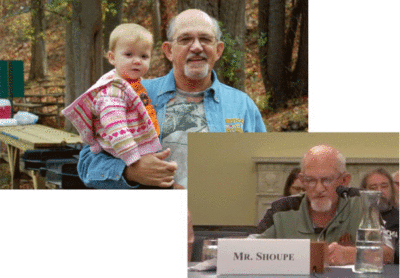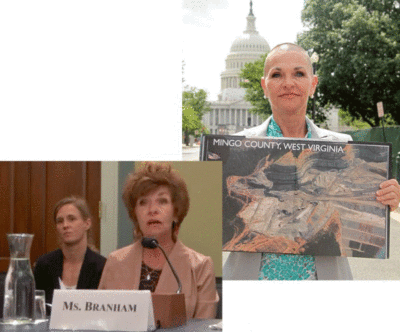
Carl Shoupe of Kentucky, with his granddaughter (above), and testifying to Congress April 9, 2019 to end mountaintop removal.
On April 9, coal-impacted community members traveled to Washington, D.C., and testified before Congress on how mountaintop removal coal mining has grievously affected their hometowns and neighboring communities. The hearing before the House Subcommittee on Energy and Mineral Resources was held to determine the impact this dangerous and permanently destructive form of mining has on public health and the environment.
Earlier in April, Rep. John Yarmuth (D-Ky.) introduced H.R. 2050, which would place a moratorium on permitting for mountaintop removal coal mining until federal health studies could be conducted. Rep. Yarmuth presented the case for his bill at the hearing:
“To this day, no federal health study has ever been conducted to examine the role mountaintop removal mining has [sic] the health and wellness of nearby communities. We got close toward the end of the Obama Administration, when a study was ordered to be conducted by the National Academy of Sciences, only to be soon halted by the Trump Administration when it was nearly halfway complete in August of 2017.”
Donna Branham, a lifetime resident of Mingo County, W.V.a, lives roughly 1,500 feet from a 1,300-acre strip mine.
“The dust and smell from the mines were ever present,” she told the subcommittee. “The dust created by blasting was so intense sometimes you could hardly see to drive. Dust got into our houses and cars. When you blew your nose coal soot would be on the tissue.”
Branham, now retired, worked as a nurse for many years.

Donna Branham of West Virginia, testifying to Congress April 9, 2019 (above), and on a previous trip to D.C. to call for an end to mountaintop removal mining.
“During my job as a nurse, I would see the adverse health effects caused by irresponsible mining. Retired miners gasping for every breath, painful joints, increased cancer rates.”
During his testimony, Kentucky Coal Association President Tyler White argued against H.R. 2050 by repeating the same old, tired complaints of “government overregulation” over the last decade. While it may be convenient for Mr. White to not even mention the effects the fracking boom had on the downfall of the coal industry, it doesn’t stand up to truth.
“The coal companies are able to do whatever they need to do to get the last bit of coal no matter the loss to the citizens, community, and environment,” said Branham in her testimony. “The burden that is placed on the people, and environment is massive.”
Carl Shoupe, a former coal miner and a member of nonprofit grassroots community organization Kentuckians For The Commonwealth, lives in Benham, Ky.
“As we speak, a coal company is seeking a permit to strip mine the ridge behind my home,” Shoupe said during his testimony. “They plan to go up the entire valley. If that happens, it will endanger our health, safety, peace of mind, property, tourism economy, drinking water, and hope for the future.”
Shoupe and three other area residents are engaged in a legal battle to have more than 10,000 acres surrounding the Kentucky towns of Benham and Lynch declared as unsuitable for mining.
Tell your representative to protect Kentucky mountains! The public comment period on the matter ends on April 30th.
“Our valley is home to three historic mining communities: Cumberland, Benham, and Lynch,” said Shoupe. “We live in a teacup, a fragile basin that is still untouched by strip-mines with their explosives and bulldozers. But to the west, east, and north of us, our mountains have been ravaged. For now our teacup still has pure water and healthy streams. Our homes still rest on fairly solid foundations. Our mountains are covered by some of the most diverse hardwood forests in North America. And our communities have developed some excellent tourist attractions. But all of that is now at risk.”
“Congress must act now to end strip-mining in Appalachia,” testified Shoupe. “We need your help to protect our health, water, and forests and invest in restoring and repairing our land, water, and people. We can build a bright future, but we have to stop the destruction now.”



Leave a Reply